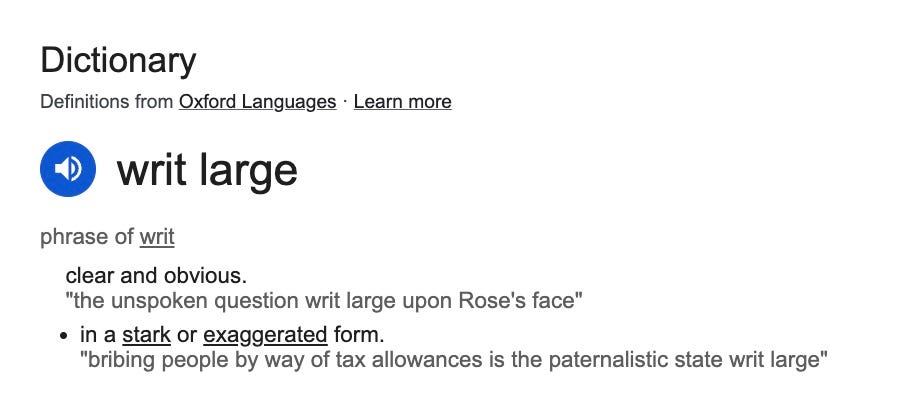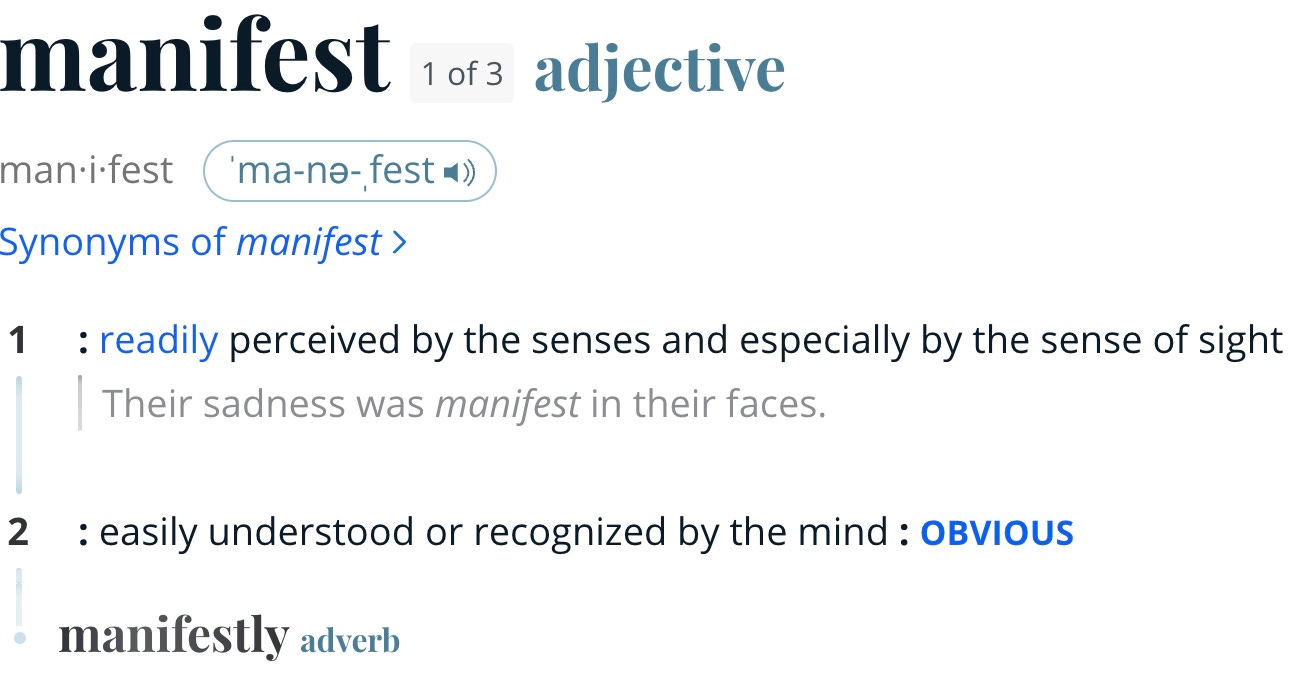A Significant Possible Crack In The Foundation Of My Knowledge
Week EIGHT | For the Joy & the Sorrow | A Significant Possible Crack
A few summers ago, on a rare road trip alone with two of my adult children (
and their big brother, Max) we got to talking passionately about the meaning of the phrase writ large.I don’t really know what started it. It could have been anything—these kinds of passionate conversations about the meaning and etymology of various words and phrases are a pastime my kids and I greatly enjoy. I can safely say my kids learned this particular pleasure from me, because I am the kind of person who is quick to wonder, “Exactly what does this or that word or phrase really mean? And how did it come to mean that?”
For example, last week in My Reasons for Writing Have Changed, I wrote about abracadabra, and its etymology, which I learned from my mentor Paul Matthews about 15 years ago, and which left a powerful impression on me—powerful enough that I share it as often as I can, because what, for writers, or anyone who does language, is more crucial than understanding that we create our lives with our words:
Maybe you know this—that the word abracadabra comes from a root that means:
my words create as I speak.
So anyway, someone that Billie or Max knew was regularly using the expression writ large and they wanted to understand exactly what it meant and honestly, I wasn’t wholly confident I knew. It sounds like it means “on a large scale,” but it doesn’t. It means “clear and obvious” or, alternatively, “stark or exaggerated.”
It’s kind of like the word manifestly, which sounds quite fancy and superlative, but does not mean superlatively, despite the writ large temptation to use it that way.
Anyway, it was a delightful conversation with my kids, cruising east on I-94 toward the dunes of Lake Michigan, where we would be staying for a week, a week that we ended up spending mostly quarantined because Max and I both got Covid, but that’s another story. Before we got Covid, we were still on the threshold of what we imagined would be a very different trip, nearing the outskirts of Chicago, sun streaming through the windshield, music playing—Max likes songs you can sing along to, so probably Prince—and talking about various words and expressions and how they are used and misused, not to be judgy, but simply because it is so interesting, it is so fascinating, really, to get up close to and all the way underneath words, to push and pull on them and poke at our assumptions about what they mean until something unexpected emerges.
Which it inevitably does—because these conversations take spontaneous and revelatory turns toward not just the etymology of a word, but also our past encounters with that word, which of course reveal versions of our past selves in the process.
And it’s funny how words and expressions get stranger and stranger the more you say and think about them, funny how the longer you say them, the less and less familiar they become, until eventually you are asking yourself if this thing you are saying is even a word at all.
Have you ever experienced something like that? It can work with pretty much any word, even something like hat or pickle, where if you attend to it close and long enough, you might feel a sort of unraveling of certainty.
I love that feeling.
And I also love, believe it or not, when I discover that a word or phrase I thought I understood well turns out to mean something slightly different than I’d understood. I love that because language fascinates me, language acquisition fascinates me, language elasticity fascinates me, and so does human cognition—the way we come to know and believe things, what happens when something or someone questions our assumptions, and, finally, how we ourselves respond to such questioning.
That’s in large part of what essay #13 in The Book of Delights is about, to my mind.
All of the essayettes in The Book of Delights are unusual in one way or another, but this one, the one we’ll look at and write in response to this week, #13—”But, Maybe …” is a genuinely odd little duck with a powerful punch.
I feel as if Gay points us to his aboutness in the very first sentence of the essay, “I was driving with Stephanie back to our beautiful, ugly little house …” Those two adjectives, “beautiful, ugly,” immediately suggest a certain multiplicity of truth and possibility contained within all things, the beautiful, ugly, despite our habit of seeing things as just one or the other.
As the essay segues into a short, snappy dialogue between Gay and Stephanie about the phrase “whoop-de-doo,” Gay names his delight directly, saying it delights him when “someone … gently alerts me to a significant possible crack in the foundation of my knowledge, lexical or otherwise.”
After musing on the “significant possible crack in the foundation of his knowledge,” including the meaning of whoop-de-doo, Gay eventually—and very skillfully—performs one of his signature moves: he drops us into a brief reverie in the form of a specific scene set in a specific time and a specific place with specific people doing specific things.
The reason I’m indulging my urge to repeat the word specific so many times is because there is so much confusion about what makes a scene a scene, when in fact it is actually less complicated than we think. A scene is always delivered in






